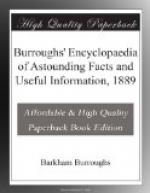How shall our teeth be preserved? The answer is very simple—keep them very clean. How shall they be kept clean? Answer—By a toothpick, rinsing with water, and the daily use of a brush.
The toothpick should be a quill, not because the metalic picks injure the enamel, but because the quill pick is so flexible it fits into all the irregularities between the teeth. Always after using the toothpick the mouth should be thoroughly rinsed. If warm water be not at hand, cold may be used, although warm is much better. Closing the lips, with a motion familiar to all, everything may be thoroughly rinsed from the mouth.
Every morning (on rising), and every evening (on going to bed), the tooth-brush should be used, and the teeth, both outside and inside, thoroughly brushed.
Much has been said pro and con., upon the use of soap with the tooth-brush. My own experience and the experience of members of my family is highly favorable to the regular morning and evening use of soap. Castile or other good soap will answer this purpose. (Whatever is good for the hands and face is good for the teeth.) The slightly unpleasant taste which soap has when we begin to use it will soon be unnoticed.
TOOTH POWDERS.—Many persons, while laudably attentive to the preservation of their teeth, do them harm by too much officiousness. They daily apply to them some dentifrice powder, which they rub so hard as not only to injure the enamel by excessive friction, but to hurt the gums even more than by the abuse of the toothpick. The quality of some of the dentifrice powders advertised in newspapers is extremely suspicious, and there is reason to think that they are not altogether free from a corrosive ingredient. One of the safest and best compositions for the purpose is a mixture of two parts of prepared chalk, one of Peruvian bark, and one of hard soap, all finely powdered, which is calculated not only to clean the teeth without hurting them, but to preserve the firmness of the gums.
Besides the advantage of sound teeth for their use in mastication, a proper attention to their treatment conduces not a little to the sweetness of the breath. This is, indeed, often affected by other causes existing in the lungs, the stomach, and sometimes even in the bowels, but a rotten state of the teeth, both from the putrid smell emitted by carious bones and the impurities lodged in their cavities, never fails of aggravating an unpleasant breath wherever there is a tendency of that kind.
REMEDIES FOR TOOTHACHE.—1. One drachm of alum reduced to an impalpable powder, three drachms of nitrous spirits of ether—mix, and apply them to the tooth on cotton. 2. Mix a little salt and alum, equal portions, grind it fine, wet a little lock of cotton, fill it with the powder and put it in your tooth. One or two applications seldom fail to cure. 3. To one drachm of collodion add two drachms of Calvert’s carbolic acid.




